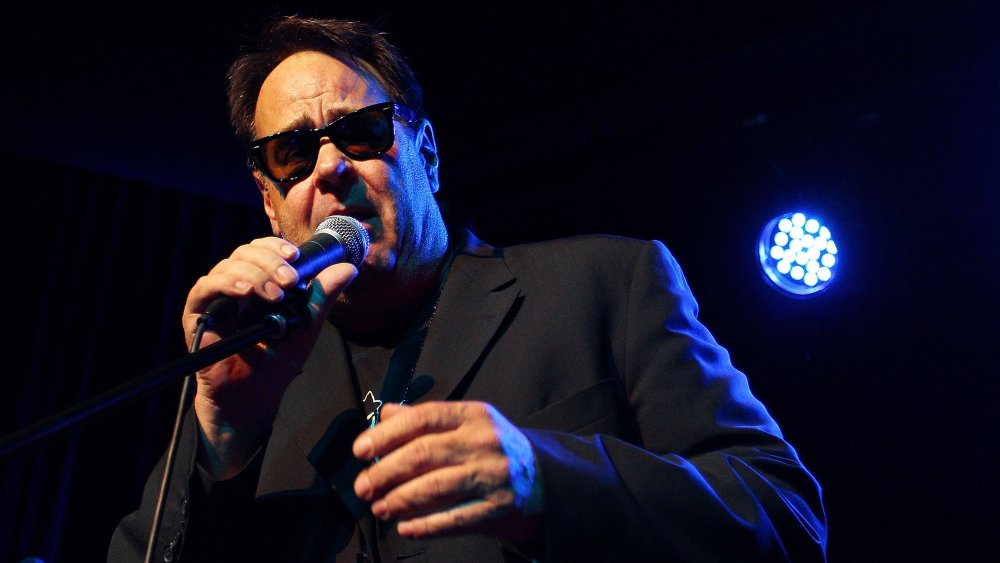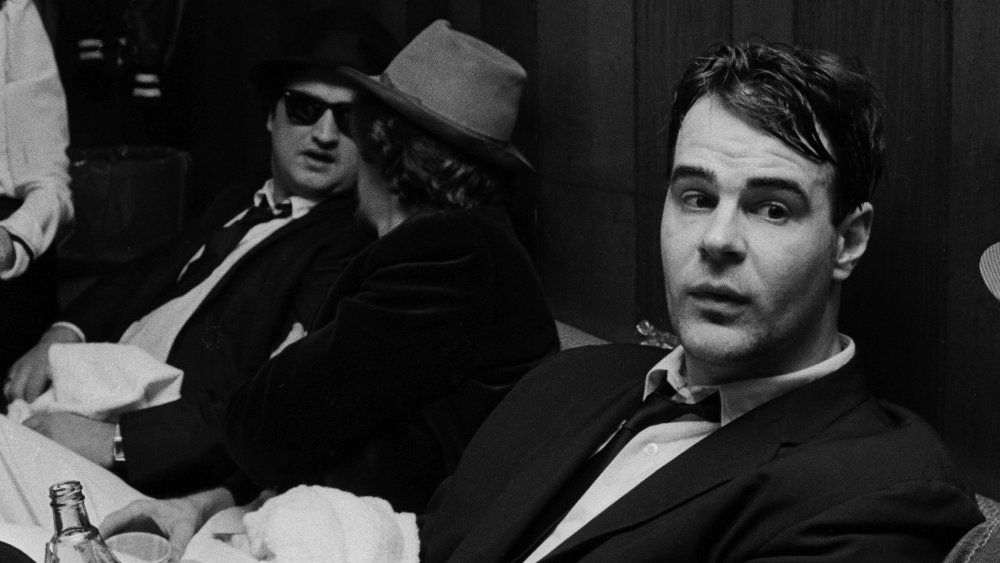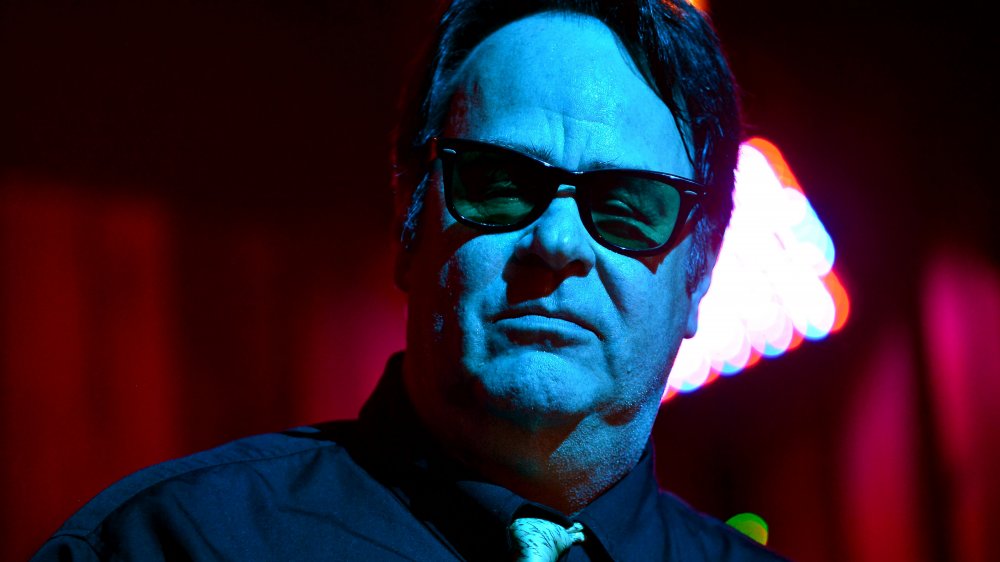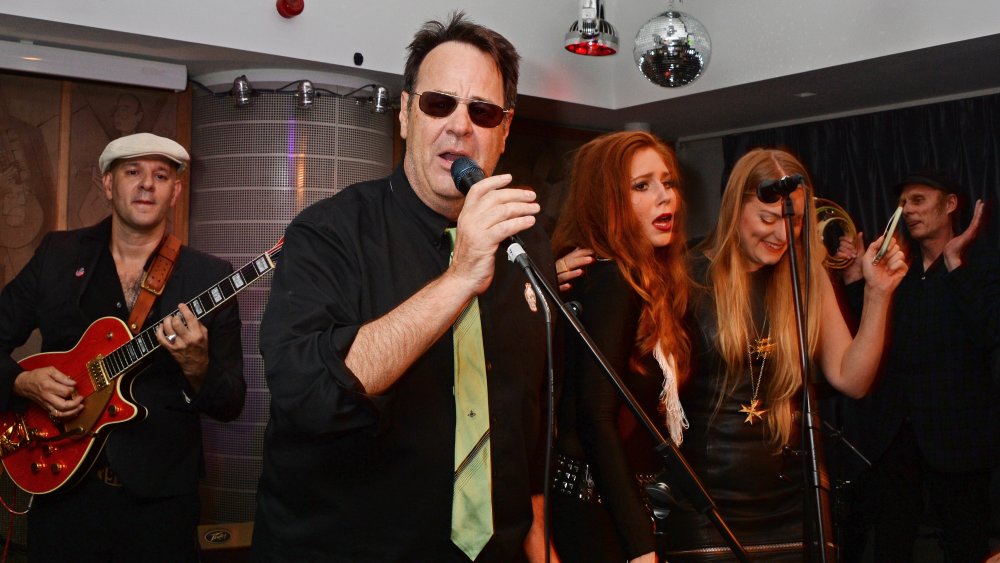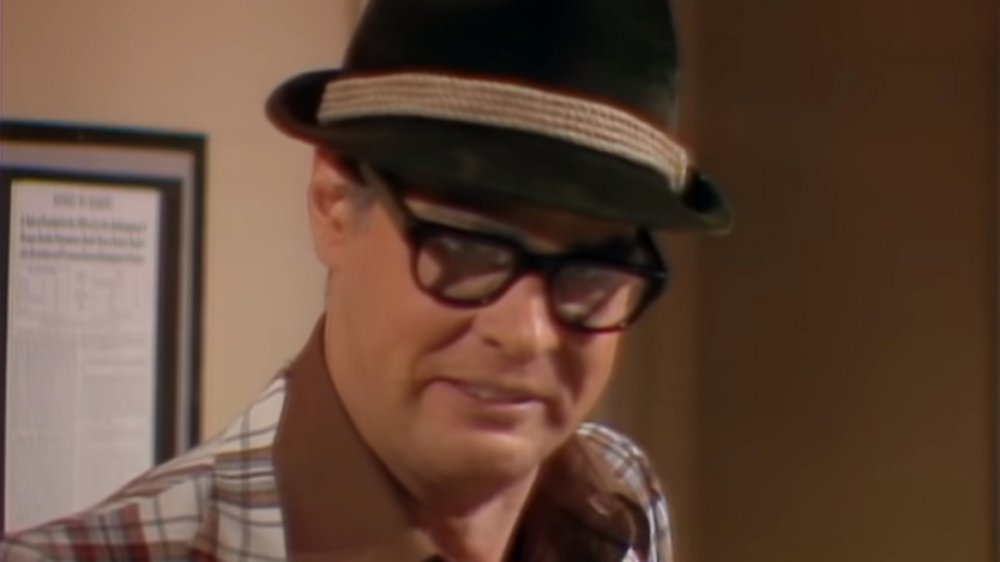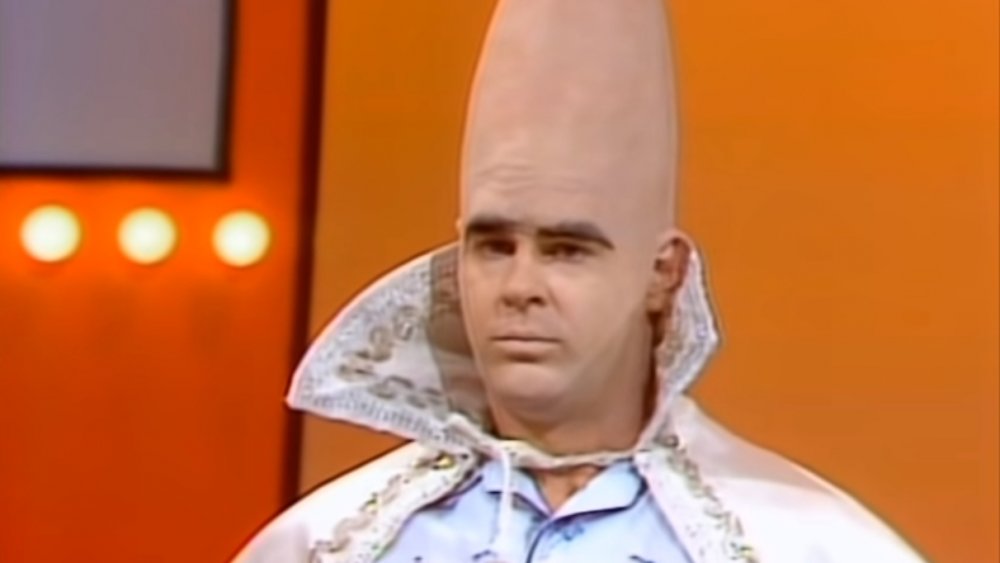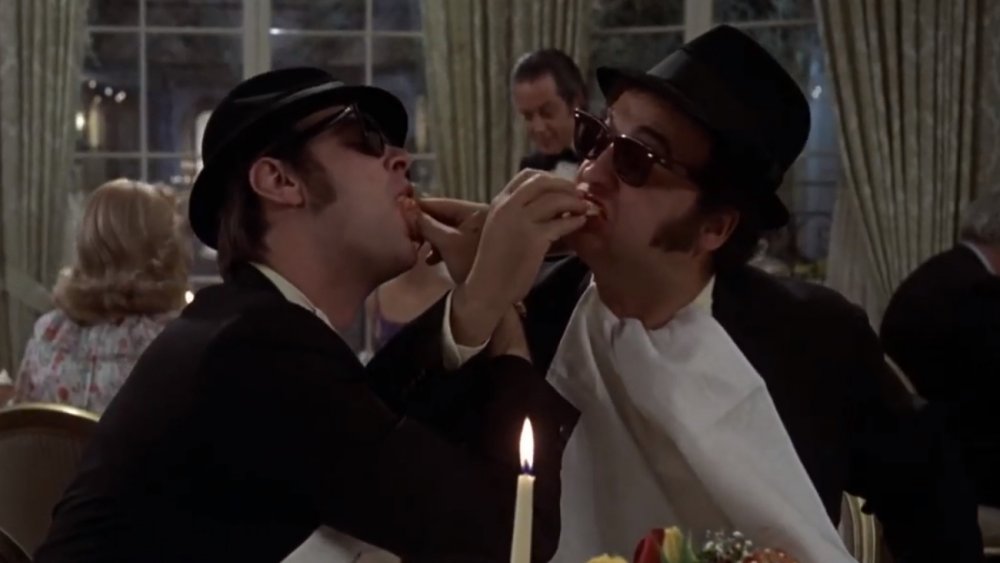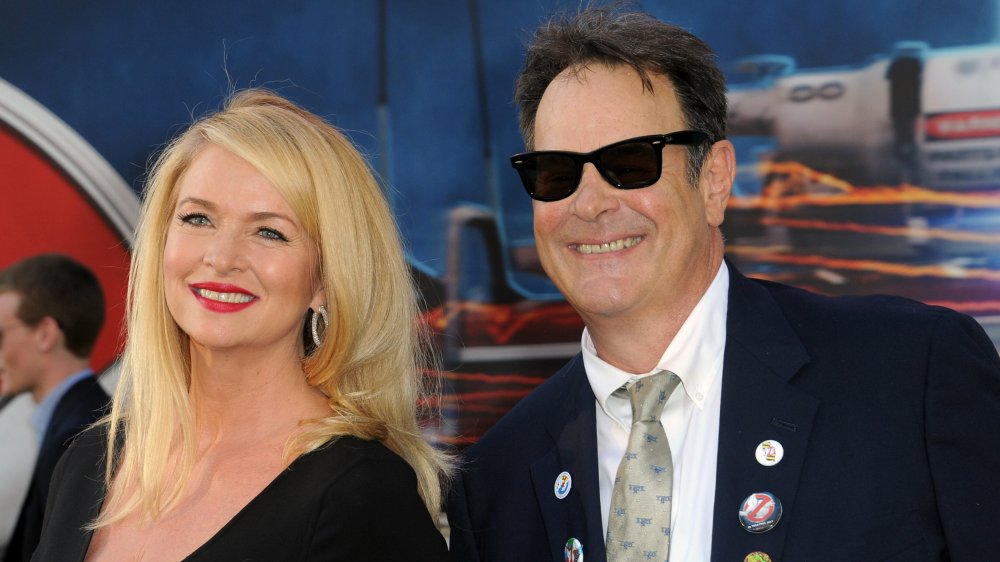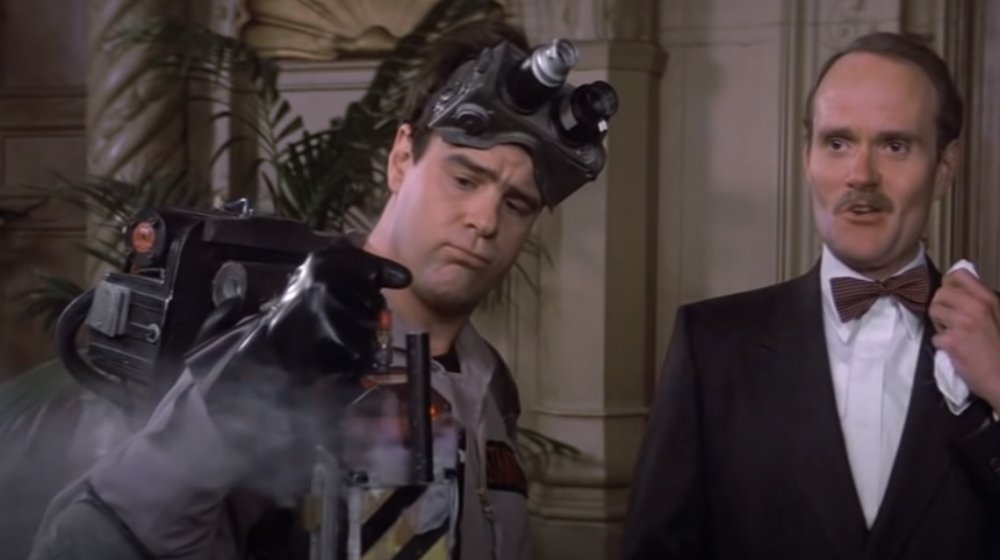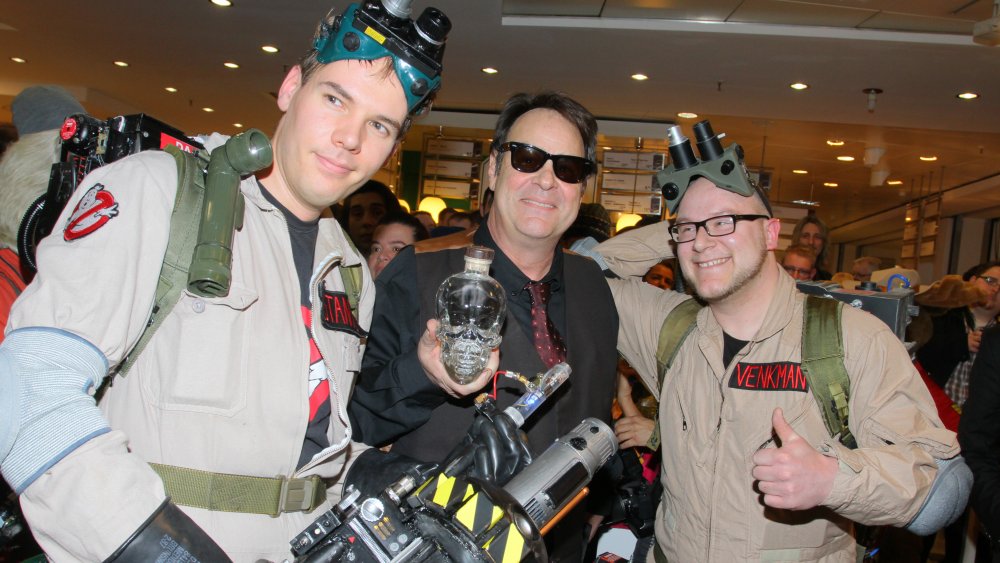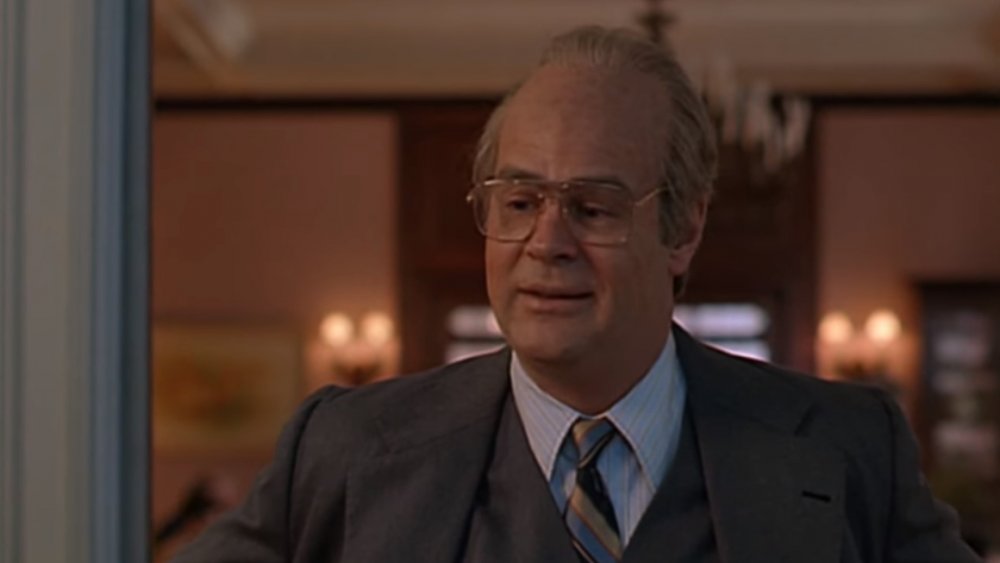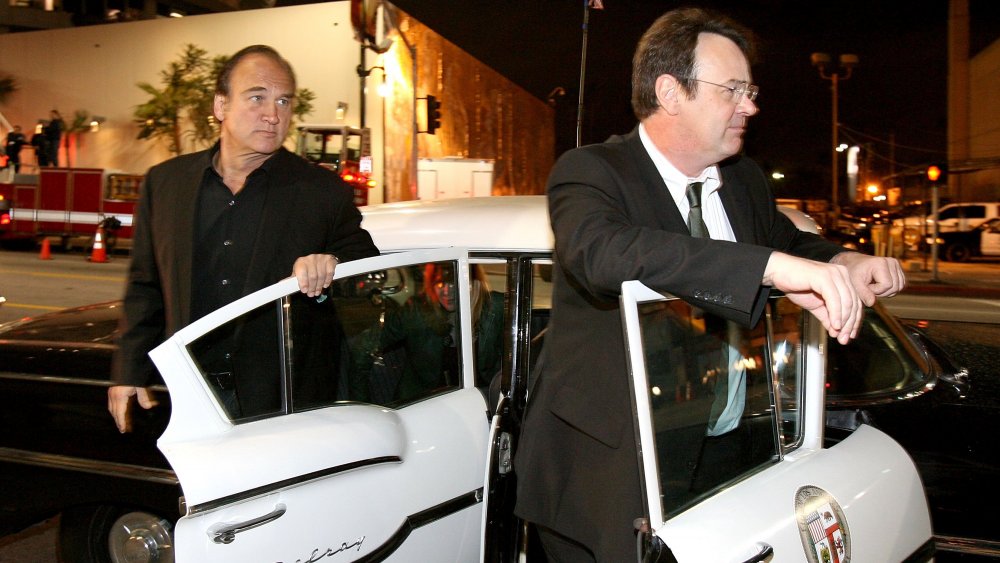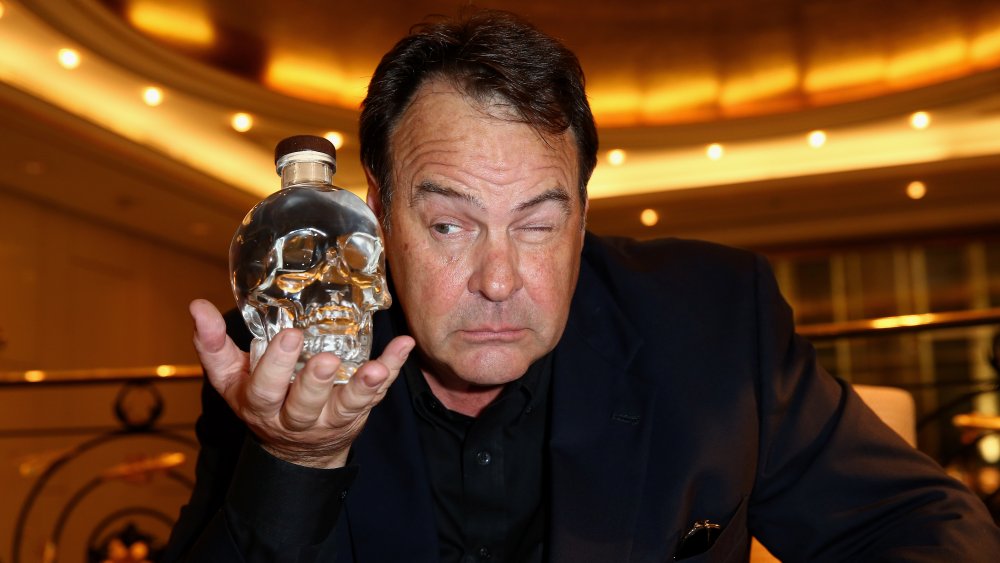The Amazing Life Of Comedy Legend Dan Aykroyd
From his early days as an original cast member on Saturday Night Live to his many roles in some of the most unforgettable comedies of all time, Dan Aykroyd has been making people laugh for over four decades. With his quirky sensibilities, outlandish characters, and hilarious impressions, he made his mark as one of the 1970s' funniest and most subversive comic talents.
Partnering with comedic force of nature and fellow SNL castmate, John Belushi, Aykroyd embarked on a successful musical career as one half of the Blues Brothers. As Jake and Elwood Blues, the duo created an iconic act that was equal parts raucous comedy and sincere tribute to classic rhythm and blues music.
The '80s would find Aykroyd soldiering on alone after Belushi's fatal 1982 overdose. In 1984, Aykroyd, along with Harold Ramis, Bill Murray, and director Ivan Reitman created one of the decade's defining moments with the blockbuster Ghostbusters.
Aykroyd's post-Ghostbusters film career has been filled with hits and misses. Nevertheless, the funnyman has branched out into other fields. As a philanthropist, Aykroyd uses his famous face and name to support causes ranging from hurricane relief to the preservation of blues music. He's also become a successful businessman as co-founder of The House of Blues chain of venues and restaurants and as co-creator of Crystal Head Vodka.
Approaching 70, Aykroyd follows his passions with the same zeal and offbeat attitude that made him a comedy legend. This is the true story of his amazing life.
Dan Aykroyd's childhood challenges
Dan Aykroyd was born on July 1, 1952, in Ottawa, Ontario, Canada. His father, Peter Aykroyd Sr., was a high ranking civil engineer who oversaw the construction of the Gatineau Parkway and later served as an adviser to Canadian prime minister Pierre Trudeau. Aykroyd's mother, Lorraine Gougeon Aykroyd worked as an executive secretary for the Canadian government, per Famous Canadian Actors. Aykroyd credits his parents' work ethic as an influence on his career. ". . . Both of them come from organizational backgrounds and both of them knew how to write," Aykroyd told Behind the Brand in 2019. "My mom was a professional executive typist in shorthand, and my dad wrote all this policy. So, when it came time to do my writing, screenplays and SNL, I'd seen how hard it was that they worked, but they got the pages produced."
Developing his talent for voices at an early age, Aykroyd honed his comedic skills impersonating his teachers. "In primary school and high school, I imitated all the teachers," Aykroyd told NPR's Terry Gross. "And then I met guys who could imitate the teachers better than me and we sort of formed these imitation squads."
Although Aykroyd's parents were supportive of their son's interests, the budding comedian faced other challenges. A nervous child, Aykroyd was diagnosed with Tourette's syndrome at age 12. Suffering from severe tics, he learned to control his symptoms with therapy. Citing his intense obsessions, interests, and habits, Aykroyd now feels that he may also have some symptoms of Asperger's syndrome, per the HuffPost Show.
Aykroyd nearly became a priest
As strange as it may seem, the man who rose to fame as Beldar Conehead, Elwood Blues, and wild and crazy Yortuk Festrunk on Saturday Night Live nearly followed a more solemn career path. Incredibly, Dan Aykroyd once considered the priesthood and entered the seminary. His good intentions, however, were derailed by his notorious rebellious streak. "I went to the seminary," Aykroyd told The Guardian in a 2003 interview. "It was a strange time. I did the whole anti-authority trip, though, getting drunk, taking girls back to the dorm. I used to sneak out in commando gear to watch the drive-in." Needless to say, Aykroyd was sent packing.
At 15, Aykroyd landed in trouble when he was arrested for public intoxication. Hoping to rein in his son's behavior, Aykroyd's father put him to work on a survey crew in the Canadian Arctic. The harsh climate and hard work had the desired effect and young Dan Aykroyd returned home with renewed purpose.
In 1969, Aykroyd entered Ottawa's Carleton University to study criminology and sociology. He was also active in the school's theatre troupe. Three years into his studies, Aykroyd left Carleton to pursue comedy full time. Although he didn't complete his degree, Aykroyd found value in his time at Carleton. "I didn't reject the University," Aykroyd told Carleton University Magazine in 1994, "and I'm sorry I didn't stay to finish my degree, but the knowledge and writing skills I picked up at Carleton have been very important to my career."
Dan Aykroyd finds joy in the blues
Dan Aykroyd is a lifelong fan and defender of traditional blues music. As a young blues aficionado, Aykroyd didn't have to travel to the Mississippi Delta or Chicago to see his musical heroes perform live. "I was fortunate to have grown up in Ottawa, Canada ... and there was a nightclub there called Le Hibou and the booker there, Harvey Glatt, brought in everybody on the circuit that was playing in Toronto and Montreal and Chicago and Boston," Aykroyd told Blues Blast Magazine. As a teenager, Aykroyd saw Chester Burnett, Otis Rush, Otis Spann, Otis Clay, Buddy Guy, and Junior Wells perform.
One memorable night at Le Hibou, Aykroyd received the honor of sitting in on drums for Muddy Waters when percussionist S.P. Leary angrily walked off stage. "I almost got through a song before S.P. Leary shooed me off the kit," Aykroyd told CBC's Tom Power.
Aykroyd has made the preservation of blues music and culture his life's mission. "Being a part of helping to keep the blues alive and helping out the artists of today, as well as the venerated artists of yesterday, is an office that I humbly take on with willingness and with a sense of gratitude," Aykroyd states.
Dan Aykroyd finds his destiny in comedy
Dan Aykroyd's talent for mimicry developed nearly as soon as he could talk. "At about three-years-old, I was imitating the announcers on TV," Aykroyd told NPR in 2004. The comedian also explained that his father was especially supportive of his interest in entertainment. "My dad cut off the top of a hockey stick and tied some tape around it and put a cord on the bottom of it and gave me a fake microphone when I was four-years-old," Aykroyd recalled.
Among Aykroyd's earliest influences was the comedy team of Mike Nichols and Elaine May, according to The Second City by Sheldon Patinkin. Nichols and May's album An Evening with Mike Nichols and Elaine May along with their appearances on The Ed Sullivan Show exposed young Aykroyd to the manic style of improvisational comedy that would characterize his own work.
While in his late teens, Aykroyd formed a comedy team with Valri Bromfield, appeared on the Canadian variety show The Hart and Lorne Terrific Hour, and landed a coveted spot as an original member of Toronto's Second City improv troupe.
Under the tutelage of Brian Doyle-Murray and Joe Flaherty, Aykroyd thrived at Toronto's Second City. Among those impressed with Aykroyd's skills was longtime Second City musical director Fred Kaz. "(Dan Aykroyd) has the most brilliant mind I've ever known," Kaz told Donna McCrohan, author of The Second City: A Backstage History of Comedy's Hottest Troupe. "He was absolutely lightning quick ... He has the mind of a calculator, the metabolism of a hummingbird, and acts like it ain't all there."
Not ready for primetime: Dan Aykroyd and SNL
Dan Aykroyd would eventually wind up with the main Second City troupe in Chicago before heading off to Pasadena, California, with friend and fellow comic John Candy to establish a West Coast Second City group, Second City explains. Around this time, Aykroyd went to meet NBC's Dick Ebersol who was co-producing an experimental, live sketch show with Lorne Micheals. Aykroyd had known Michaels for years having appeared on his Canadian variety program The Hart and Lorne Terrific Hour.
Aykroyd wound up auditioning for Saturday Night Live several times before getting the gig. Near the last in line at a final cattle call, Aykroyd went for broke. "So, I just kind of cut through the line and busted into the room," Aykroyd told Tom Shales, author of Live From New York: An Uncensored History of Saturday Night Live. "I said, 'Well, I'm here,' and I did sort of a quick five-minute kind of fast rap and got out of there. After that audition, it was clear I had the job."
Initially brought on as a writer, Aykroyd was soon added to the cast as a performer. Saturday Night Live was an instant hit with young audiences, and the show's success was in no small part due to Aykroyd and his quirky, subversive approach to comedy. Creating such memorable characters as The Coneheads, unscrupulous businessman Irwin Mainway, sleazy E. Buzz Miller, and the unforgettable Fred Garvin, Aykroyd won an Emmy for outstanding comedy writing in 1977.
The Blues Brothers: a tragic friendship
The duo that would become The Blues Brothers first met in 1973 when Dan Aykroyd met John Belushi backstage at Toronto's Second City. Belushi was in Canada recruiting talent for National Lampoon. Dan Aykroyd told Vanity Fair's Ned Zeman, "We took one look at each other. It was love at first sight."
Aykroyd turned down Belushi's offer, but the Canadian funnyman gave him something else that would forever cement their friendship —an introduction to the blues. By the time Belushi, a self-proclaimed rock 'n' roller, left for New York, he was a confirmed convert to the gospel of Howling Wolf, Muddy Waters, and Albert King.
According to History, the Blues Brothers officially made their TV debut in 1978. The act was a hit. Backed by a band of professional musicians, The Blues Brothers debut live album reached number one on the Billboard charts.
In 1980, the original Blues Brothers reached their peak with the release of their only film. Unfortunately, Belushi's struggles with drug addiction complicated the production. Nevertheless, Dan Aykroyd stuck by his friend and encouraged him to get clean. Two years later, John Belushi died of an overdose of cocaine and heroin at L.A.'s Chateau Marmont. "I think about him every damn time I walk into a House of Blues," Aykroyd told The Guardian in 2003. "I think, 'Why aren't you here, man, to enjoy all this?'"
Love and marriage for Dan Aykroyd
Dan Aykroyd met Carrie Fisher on the set of Saturday Night Live in 1978. The Star Wars actress became fast friends with Aykroyd and John Belushi thanks to her famously acerbic wit. Fisher and Aykroyd took their relationship to the next level in 1980 when she appeared as "Joliet" Jake Blues' spurned girlfriend in The Blues Brothers.
In his touching Empire Magazine tribute to Fisher, Aykroyd remembered their whirlwind romance. "While filming Blues Brothers, Carrie and I fell in love and during the shoot she moved in with me. ... Contemplating marriage, I gave Carrie a sapphire ring and subsequently in the romance she gave me a Donald Roller Wilson oil painting of a monkey in a blue dress next to a tiny floating pencil."
Although Fisher left Aykroyd for musician Paul Simon, the comedian cherishes the time he spent with her. "You can imagine how much of a privilege and honour it was for me to have known this one-off, broke-the-mould woman as a great friend," Aykroyd said.
Following his breakup with Fisher, Aykroyd met actress Donna Dixon on the set of his movie Dr. Detroit. Best known for her role on the '80s Tom Hanks sitcom Bosom Buddies, Dixon was seeing musician Paul Stanley of KISS when she hit it off with the comedian. Dixon credits comic actress Fran Drescher for helping her find the courage to approach Aykroyd.
Married in 1983, Aykroyd and Dixon have three daughters. Their eldest, born Danielle Aykroyd, is musician Vera Sola.
After SNL: Dan Aykroyd and the movies
Dan Aykroyd's first post-SNL project found him writing and co-starring in a big-screen take on The Blues Brothers. Unfamiliar with the process of screenwriting, Aykroyd composed a gargantuan script running 342 pages outlining The Blues Brothers' origins. Director John Landis took on the daunting task of whittling Aykroyd's story into a shootable form. Despite its notoriously chaotic production, The Blues Brothers was a hit with both audiences and critics.
Aykroyd teamed with Belushi for the final time in 1981's Neighbors. Featuring an inversion of the duo's formula with Aykroyd as an over-the-top comedic presence to Belushi's beleaguered straight man, the film was a flop. And 1983's Doctor Detroit, Aykroyd's first film after Belushi's death, also failed to connect.
The following year marked a change in Aykroyd's cinematic fortunes. Once again under the direction of John Landis, Aykroyd landed a hit opposite Eddie Murphy in 1983's Trading Places. However, Dan Aykroyd's next movie would catapult him to a level of success that eclipsed even his SNL heyday.
Turning to his lifelong fascination with the paranormal, Aykroyd conceived of Ghostbusters as a modern take on classic ghostly comedies like Bob Hope's The Ghost Breakers and Abbott and Costello's Hold That Ghost. Co-written by Aykroyd and Harold Ramis, and directed by Ivan Reitman, Ghostbusters was the smash hit of the summer of 1984. A pop-culture landmark and a defining moment of the 1980s, Ghostbusters has a dedicated following that has kept it relevant for nearly four decades after its original release.
Dan Aykroyd's paranormal obsessions
Nearly on the same level as his love of blues music is Aykroyd's obsession with all things paranormal. A believer in ghosts and psychic phenomenon from an early age, Aykroyd describes his interests as part of his family heritage. "...My great grandfather, Sam Aykroyd, who was a dentist in Kingston was also a psychic researcher," Aykroyd told the CBC's George Stroumboulopoulos. "That's where Ghostbusters comes from."
Aykroyd's father, Peter Aykroyd Sr., was witness to many strange goings-on at the family farmhouse including seances conducted by grandfather Sam Aykroyd. In 2009, he published A History of Ghosts: The True Story of Séances, Mediums, Ghosts, and Ghostbusters, a book chronicling the Aykroyd family's exploits in the supernatural.
The spirit world was simply a fact of life in the Aykroyd household. "Just as you'd see Life Magazine or National Geographic lying around ... we had The American Society for Psychical Research Journal lying around," Dan Aykroyd says.
An adherent of Spiritualism, a religious movement popular in the early 20th century based in the belief that the dead can communicate with the living, Aykroyd told The Guardian's Sean O'Hagan, "I believe that [ghosts] are between here and there, that they exist between the fourth and the fifth dimension and that they visit us frequently."
Dan Aykroyd's Oscar nomination
Dan Aykroyd will forever be remembered for his quirky characters. However, in 1989, Aykroyd received the rare opportunity to explore a subtler side of his talents. In the dramatic comedy Driving Miss Daisy, based on Alfred Uhry's Pulitzer Prize-winning play, Aykroyd plays Boolie Werthan, the long-suffering son of the irascible Daisy Werthan (Jessica Tandy), who hires chauffeur Hoke Coburn (Morgan Freeman) to drive for his aging mother. A touching statement on prejudice and friendship, Driving Miss Daisy won the Academy Award for Best Picture in 1990 and Jessica Tandy won honors for Best Actress. Aykroyd was nominated for Best Supporting Actor but lost to Denzel Washington.
For the first time in his career, Aykroyd was recognized as a serious actor. "If this proves anything," Aykroyd told The Oklahoman in 1989, "it should prove that we comedians can do other work besides getting in front of a camera and going crazy."
Deputy Dan Aykroyd
Despite the irony of having starred as outlaw musician Elwood Blues, Dan Aykroyd is an avid police bluff and supporter of law enforcement. A badge collector with an encyclopedic knowledge of weapons and police gear, Aykroyd is a former reserve commander with the Harahan, Louisiana, Police Department. Although he retired from the Harahan reserve forces in 2011, he was sworn in as a deputy with the Hinds County, Mississippi, Sheriff's Department in 2014. As a reserve police officer, Aykroyd helped with relief efforts following Hurricane Katrina. He has also donated equipment to underfunded police departments and pledged money to the families of fallen police officers.
According to The Second City: A Backstage History of Comedy's Hottest Troupe, Aykroyd seriously considered a career in law enforcement. Around the time the comedian was accepted into Second City, his application for the Royal Canadian Mounted Police was approved. Ultimately, the Mounties' loss was comedy's gain.
Dan Aykroyd, entrepreneur
In 1992, the comedy legend partnered with entrepreneur Isaac Tigrett to found The House of Blues. A successful chain of music venues and restaurants, The House of Blues branched into philanthropy with the inception of the House of Blues Music Forward Foundation. Created in 1993, Music Forward promotes music education for young people in underserved communities.
In 2005, Aykroyd entered the alcohol industry as the Canadian importer for Patron Tequila, opening up the company to a new market in North America, per BBC. After learning the liquor business with Patron, he partnered with artist John Alexander to create Crystal Head vodka. With its unique, skull-shaped bottle, Aykroyd fused the award-winning distilled spirit with his love of the supernatural.
Dan Aykroyd credits his success as a comedian and a businessman to a common denominator. "Quality always endures," Aykroyd told Lehigh Valley Live. "It is like that in every business, whether it is Hollywood or vodka-making."
